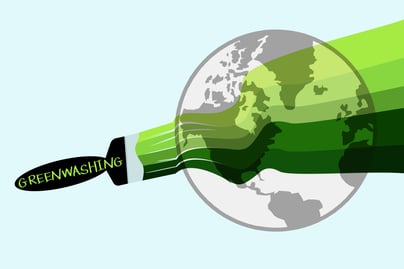The Role of Data in Avoiding Greenwashing: Transforming the Food Industry and Supply Chain
By Damien Smith, CEO, Ecodesk
In an era of growing environmental consciousness, consumers are increasingly demanding sustainable and ethical practices from the companies they support. However, this has given rise to a concerning trend known as "greenwashing," where companies falsely present themselves as environmentally friendly without backing their claims with substantial evidence. The food industry, with its complex supply chains and environmental impact, is particularly susceptible to greenwashing. To combat it, the effective utilisation of data is a crucial tool in ensuring transparency, accountability, and genuine sustainability.
The challenge of greenwashing in the food industry

The food industry plays a pivotal role in shaping the environmental landscape due to its vast supply chains, resource consumption, and waste generation. With the increasing demand for sustainable products, companies have realised the marketing advantages of presenting themselves as eco-conscious. However, without proper regulations and mechanisms in place, greenwashing can mislead consumers and undermine genuine efforts to address pressing environmental challenges. To bridge this gap, data-driven approaches have emerged as powerful instruments to expose greenwashing and foster meaningful change throughout the food supply chain.
Harnessing data for transparency and accountability

Data-driven solutions enable stakeholders, including consumers, to access accurate and comprehensive information about a product's environmental impact and the practices employed by companies. Utilising various data collection methods, such as life cycle assessments, carbon footprint analyses, and certifications, companies can provide verifiable evidence of their sustainability claims. These data-driven approaches allow for transparency and accountability at each stage of the food supply chain, from farm to fork.
Driving genuine sustainability efforts
By utilising data to identify environmental hotspots and inefficiencies in the food supply chain, companies can pinpoint areas for improvement. With access to granular data, they can implement targeted strategies to reduce greenhouse gas emissions, water usage, and waste generation to name but a few areas. This data-driven approach not only helps companies avoid greenwashing but also drives genuine sustainability efforts that are measurable and impactful.
Collaboration and Regulatory Frameworks
To maximise the effectiveness of data in combating greenwashing, collaboration between industry stakeholders, governments, and NGOs is crucial. Establishing standardised frameworks and regulations can ensure the integrity of sustainability claims and create a level playing field. These frameworks should encompass comprehensive data disclosure requirements, independent audits, and clear labelling standards. ESG Lead, a new tailor-made software tool for the food industry, does exactly this. Backed by BRCGS, ESG Lead is designed to empower food businesses of all sizes to evaluate and improve their impact, market positioning, and bottom line by recommending achievable targets tailored to individual business profiles and user roles and then curates action plans to deliver these.
ESG Lead enables every site within an organisation to deliver and share its specific targets, action plans and ESG performance with its key business stakeholders:
- Personalisation: Once information has been entered about an 1organisation’s performance and targets have been established, ESG Lead will deliver curated targets and guidance to build a robust and lasting responsible business framework.
- Set and measure commitment: This business framework will then empower users to define a business’s future whilst tracking and measuring ESG progress.
- Progress: Users can access expert guidance on actions and processes so businesses can consistently continue to improve.
- Report: Users can share reports and progress tailored to every type of stakeholder – from customers to investors.
- Invite: Improve at scale by inviting the business value chain to participate and enable measurement of ESG impact across the food industry.
The fight against greenwashing in the food industry requires a multifaceted approach, and data-driven solutions play a pivotal role in achieving genuine sustainability. Through the application of reliable data, transparency and accountability can be fostered, enabling consumers to support companies that truly prioritise the environment. Collaboration among industry players and the establishment of regulatory frameworks are essential in creating a transparent and trustworthy food supply chain. By harnessing the power of data, we can transform the food industry into a force for positive change, ensuring a sustainable future for all.
For more information contact: Damien at damien.smith@ecodesk.com


